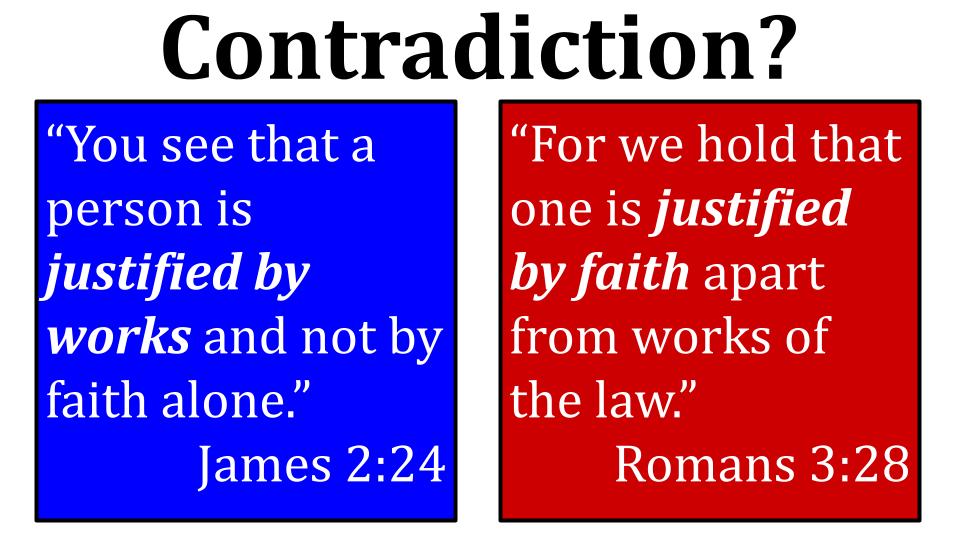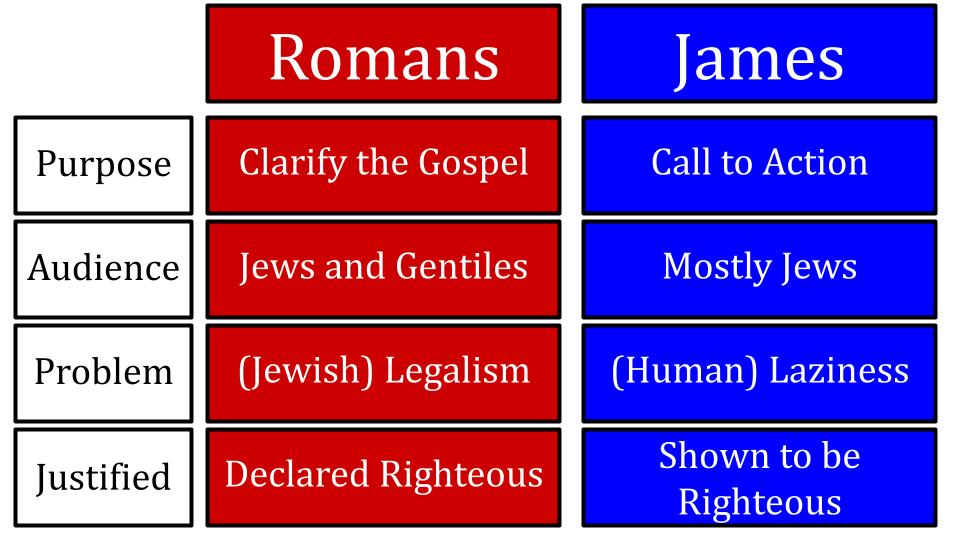
At a glance these two verses do not seem compatible with one another. Did James and Paul disagree on a core matter of doctrine? Were they at odds with each other in general?
As with all matters of Bible interpretation – context is the key.
What is James doing in chapter two of his letter? What is his message, his audience, his purpose?
What is Paul doing in chapter three of his letter? What is his message, audience and purpose?
Turns out the two letters and authors have very different goals which lead them to use the same word but with a different meaning. This is actually very common in every language. Context always determines meaning.
“He is on fire.”
What does that sentence mean? Is a person in danger of serious harm or is he doing really well in a sport or being very energetic in a presentation? It depends on the context of the statement.
“A person is justified.”
The verb “to justify” is based on the noun “righteousness” but we don’t use the phrase “righteous-i-fy.” And our word “justice” carries a meaning somewhat different from righteousness in the Hebrew and Greek, though the two terms are closely related (and often used together in the Old Testament).
“He loves righteousness and justice; the earth is full of the steadfast love of the Lord.”
Psalm 33:5
“He will bring forth your righteousness as the light, and your justice as the noonday.”
Psalm 37:6
So to be “justified” could mean to be “declared righteous” or “shown to be righteous.” The meaning in a given verse must be determined by its surrounding context. This is one of the main reasons that Catholics and Evangelicals disagree on the doctrine of substitutionary atonement – because Catholics prefer the “shown to be righteous” definition, even in Romans. They consider the imputation of the righteousness of Jesus to sinners based on faith alone to be “a legal fiction.” One can only be “declared righteous,” when all the facts are in, when your entire life has been lived and when you stand before God in the final judgment. Evangelicals, by contrast, would say that sanctification is the process of becoming righteous and justification is the very real, very just declaration of a holy God at the moment of saving faith.
It has long been said in summary that Evangelicals tend to focus on the roots of saving faith while Catholics tend to focus on the fruits of genuine life change. Both agree that both roots and fruits are essential in the Christian life. And the same can be said for James and Paul.
So does the Bible contradict itself? Not at all. James and Paul simply had different goals, so they used the same word to convey a different meaning.

Romans is the longest exposition in the Bible of the good news that “the righteousness of God” (Rom. 1:17) was revealed in Jesus Christ not to condemn sinners who fall short of the glory of God (Rom. 3:23) but to save them through an internal, spiritual transformation accomplished by faith alone.
“But now the righteousness of God has been manifested apart from the law, although the Law and the Prophets bear witness to it— 22 the righteousness of God through faith in Jesus Christ for all who believe. For there is no distinction: 23 for all have sinned and fall short of the glory of God, 24 and are justified by his grace as a gift, through the redemption that is in Christ Jesus…”
Romans 3:21-24
“Then what becomes of our boasting? It is excluded. By what kind of law? By a law of works? No, but by the law of faith. 28 For we hold that one is justified by faith apart from works of the law.”
Romans 3:27-28
The context of this passage and of the book of Romans makes the meaning “declared righteous,” Paul’s definite intention when he says “one is justified.” “Shown to be righteous,” in this context would utterly confuse the meaning and actually undermine Paul’s whole message. It’s like saying “that basketball player has combusted into flames with that three pointer.” I think you mean, “he’s on fire.”
James, by contrast, was not trying to explain the doctrinal underpinnings of salvation by grace alone through faith alone. His goals were much more practical, much more targeted at things like loving speech, hosting strangers, care for the poor and endurance through suffering.
“What good is it, my brothers, if someone says he has faith but does not have works? Can that faith save him? 15 If a brother or sister is poorly clothed and lacking in daily food, 16 and one of you says to them, “Go in peace, be warmed and filled,” without giving them the things needed for the body, what good is that? 17 So also faith by itself, if it does not have works, is dead.”
James 2:14-17
“Was not Abraham our father justified by works when he offered up his son Isaac on the altar? 22 You see that faith was active along with his works, and faith was completed by his works; 23 and the Scripture was fulfilled that says, ‘Abraham believed God, and it was counted to him as righteousness’—and he was called a friend of God. 24 You see that a person is justified by works and not by faith alone.”
James 2:21-24
Here in James 2:24 “shown to be righteous” is the obvious meaning for “justified.” The works of actually serving a brother in need – providing food, clothing and shelter – prove that the love of Jesus is alive in you. Your good works complete your faith by showing that it is real and giving it an outlet in your life. “Declared righteous,” here would shift the imagery from serving a hungry person into a courtroom scene with a judge holding a gavel – where did that guy come from? That would be like the end of a close basketball game and your friend says, “he’s on fire!” while pointing not to the court but to someone running up into the stands. If actual flames are spreading through a section of the stadium (and onto people) your perspective on the phrase would change quickly and so would your plans for the next few minutes.
Whenever you run across something in the Bible that seems strange or confusing just remember: context is King. Keep reading. Study and dig deeper and before long you’ll see not only what the author is saying but what the author is doing in that passage. The Bible is a complicated book but every word and every verse was inspired by God for a specific reason (or two or three). Enjoy the process of figuring out what those reasons are!
